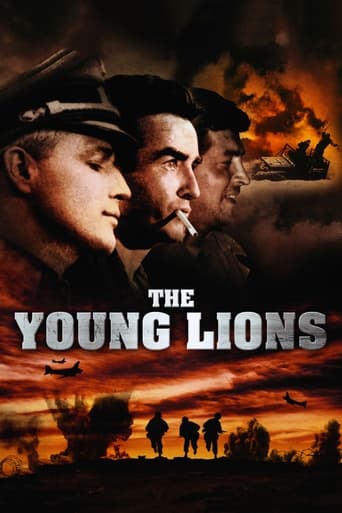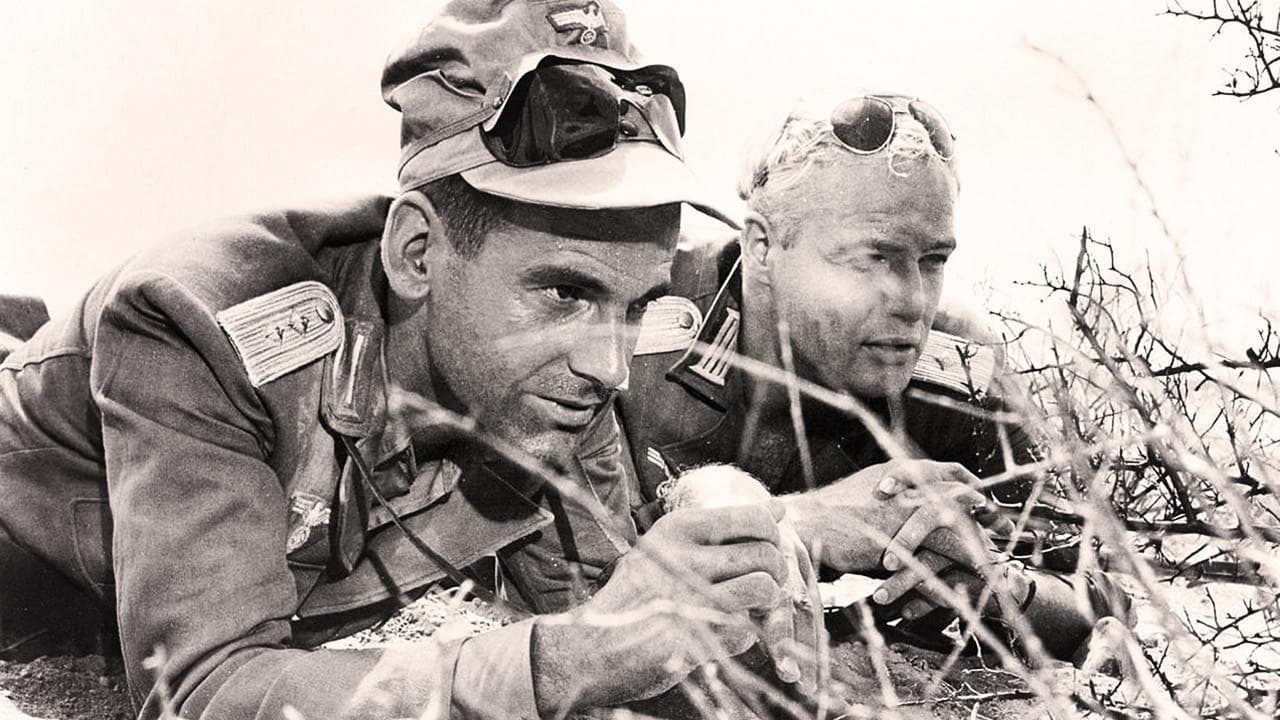wes-connors
After the opening credits, we begin with New Year's Eve, 1938 in Bavaria, Germany. Blond shoemaker Marlon Brando (as Christian Diestl) is working part-time as a ski instructor. He enjoys a romance with American beauty Barbara Rush (as Margaret Freemantle). They break up when Mr. Brando joins the Nazi army. She is suspicious of German chancellor Adolf Hitler's political intentions, but Brando is not. He hopes Hitler will bring prosperity to Germany. World War II begins. On the other side of the Atlantic Ocean, American men are drafted as the country prepares for a war. At the draft board in New York City, Jewish store clerk Montgomery Clift (as Noah Ackerman) surrenders a cigarette to nightclub and radio singer Dean Martin (as Michael Whiteacre) and the men become fast friends. At a party, Mr. Clift begins a romance with pretty blonde Hope Lange (as Hope Plowman) while Mr. Martin dates Ms. Rush..."The Young Lions" was based on Irwin Shaw's 1948 best-selling novel. The 1958 adaptation does not really work – in this particular case – as it really plays out like two different films, weightlessly edited together. Brando and director Edward Dmytryk appear to have cooperated on changing his character to appear more sympathetic. Perversely, this strengthens Brando's portion of the film, giving his characterization more depth; however, it does little for the film as a unit. The most interesting role is portrayed by Clift, who is engaging in a role which recalls his classic appearance in "From Here to Eternity" (1953). Heralded as the third lead, Martin is good as a supporting player in Clift's half of the story. The three men may be little old for the parts, but are plausible...Rush is an underrated actress and she shows that here, especially in her scenes with Martin. Now appearing without comic partner Jerry Lewis, Martin remains appealing. Rush is a tenuous link between the US and German men. She, Ms. Lange and a seductive May Britt (as Gretchen Hardenberg) are distinctly beautiful – but the story is not about them. Brando's half benefits by contrasting his character with more loyal Nazi soldier Maximilian Schell (as Hardenberg). Filmmakers would have been wise to increase Mr. Schell's role and parallel him – through cinematic trickery – with Clift's character. Brando and Martin are also parallels. For reasons unfathomable in hindsight, there is no real scene for Brando and Clift to play, together. They do cross paths at one point, but do not really interact like you may be hoping. That someone could not write a small scene, at least, for the two highly regarded actors is a major disappointment.******* The Young Lions (4/2/58) Edward Dmytryk ~ Marlon Brando, Montgomery Clift, Dean Martin, Maximilian Schell
dimplet
The best movies are ones that have a message that cannot be conveyed easily in a few words. Such is The Young Lions. And the core of the message is found in the ending, which I do not want to disclose. But it is a relatively quiet scene that is actually a kick to the solar plexus, intellectually.Yes, Brando delivers the more interesting and even sympathetic performance, once he warms up. But Clift's performance is perhaps finer acting, displaying great emotional vulnerability.The message of this movie was daring for 1958. It treats the enemy - the Germans - with objectivity, compassion and even some sympathy, while being critical of American faults and anti-Semitism. I think it is saying that we are all human, regardless of side, and we are all capable of committing evil acts if put in the wrong situation, up to a point. If your inner character is good and strong, you will not participate, though, as we see with Brando's character, Diestl. This is a message that is as important today as it was half a century ago, if not more so, as we see with atrocities such as those committed by American servicemen in Abu Ghraib prison, acts that we might have seen from Nazis. A key difference is that in America such acts are illegal and punished in courts. Yes, the anti-Semitic root of the harassment of Ackerman in the barracks is implied, rather than spelled out, unlike in the book. Why? Hollywood, which was largely controlled by Jewish moguls at the time, was reluctant to make anti-Semitism an issue, fearing a backlash. (The only movie to tackle anti-Semitism was a Gentleman's Agreement, made in 1947, just before Congressional HUAC hearings on Hollywood, and the blacklisting of writers, actors and directors.) I, for one, being Jewish, don't miss the anti-Semitic expletives. And the movie turns Ackerman into a representative of any American minority in the Army who is harassed but eventually accepted. But what has been largely forgotten is that there once was virulent anti-Semitism in America, and active, organized support for the Nazis in areas such as the Midwest during the 1930s run-up to Pearl Harbor. We're talking pro-Nazi meetings in middle class homes. This is the real subtext of Irwin Shaw's story. However, America was not Nazi Germany, in ideals or actions. And one of the key differences is America's objectivity and ultimate honesty. That is what makes The Young Lions great. I am proud that it treats the Germans objectively. Another movie along these lines is "The Desert Fox: The Story of Rommel," made, remarkably, in 1951. What many viewers do not understand is that it was illegal for members of the German military to enlist in the Nazi Party or engage in politics, even during the war. So officers such as Diestl were not Nazis, at least technically. They did swear an oath to support Hitler early on. It was the SS, the Schutzstaffel, a paramilitary organization, that was the arm of the Nazis. Nevertheless, plenty of regular German soldiers engaged in war crimes. But The Young Lions is saying do not judge each soldier or citizen by the acts of the group or nation. It is as wrong to engage in such prejudice toward Germans as it is against Jews or any group or nationality. The German people, to their credit, have largely faced up to the wrongs of WWII objectively. I think the tradition of intellectual honesty at the heart of Germany and Europe helped. The result is the modern world of reconciliation of former European enemies, something that is at least partially absent in Asia.The movie Stalingrad - 1993 is a stunning, raw German mea culpa that provides additional background for understanding movies such as this and Rommel. Watching The Young Lions lacks the drama and intensity found in many war movies. But it is a story that makes you think, and that lingers in your memory long after the movie is through. That is what gives it greatness. It is a movie more people should watch.
JasparLamarCrabb
Edward Dmytryk directs this film version of Irwin Shaw's novel and it's not particularly good. That's a shame because at nearly 3-hours long, one would expect something beyond a well polished soap opera. It's the story of WWII told from both the American & German perspective. On the American side, there's Broadway entertainer Dean Martin and lost soul Montgomery Clift. On the German side, there's Marlon Brando as a disillusioned army captain. The film follows their trials and tribulations as well as their love lives. Brando plays his part like an actor afraid to go all out. His German is made into an idealistic saint. Clift, however, is a complete disaster. He's woefully miscast and about 10 years too old for his part. He's also clearly infirm, this being some of his first acting following his near catastrophic car accident in 1957. Martin comes off best, as he's playing a less comic version of his own persona. Dmytryk does a dis-service to the entire proceedings by relying heavily on war-time stock footage. The supporting cast is large and includes Lee Van Cleef, Hope Lange, Barbara Rush, Dora Doll (as Simone), and French chanteuse Liliane Montevecchi as Brando's strong-willed love interest. Maximilian Schell gives a fine performance as Brando's commanding officer. Hugo Friedhofer contributes a rousing score, but it's largely lost on this snail-paced epic.
Robert J. Maxwell
This film would be outstanding if only because it brought together three actors whose talent was unimpeachable -- Marlon Brando as the idealistic but ultimately disillusioned German lieutenant, Montgomery Clift as the wimpy but spunky Jewish GI, and Maximilian Schell as the ruthless, professional but not entirely unsympathetic German officer. Brando and Clift were both a bit past their prime, displaying mannerisms that would become habitual, and both were a bit old for their parts. Brando spends most of his time towards the end glowering. And Clift has the Make Up Department pin his ears outward, giving him and his already ruined face an outlandish prospect. But, man, can these boys act! Schell came into his own with superb performances in later, sometimes regrettable films like "Judgment at Nurenberg." But even in small roles, as in "The Freshman," he was a constant delight on the screen.The rest of the cast is up to professional standards. May Britt looks like some kind of Aryan predatory animal. (Yum.) Dean Martin established his acting career with this movie, after his split with Jerry Lewis. He could always be relied upon to play Dean Martin, though never memorably, his talents best suited to light comedy rather than dramatic parts. Here, he's a coward who, after a multitude of tergiversations, finally makes an existential decision prompted by Barbara Rush.There are, almost of necessity, romances involving the three principals -- Brando meets a French girl who despises Germans but comes to sympathize with his increasing despondency. I didn't find Francoise particularly appealing. She seemed to enjoy her exuberant attacks on Brando's character a little too much. And she's groomed a la gamin, petite, girlishly cruel voice, big black eyes with furry lashes, and short, curly black hair. Needs a good spanking if you ask me. Dean Martin does everything possible to avoid the Army and, after that fails, to avoid combat. Barbara Rush is his conscience as well as his main squeeze among what we take to be many.The love story involving Clift and Hope Lange is actually touching and even moving at times. It probably wouldn't be, except that Clift is SO homely, helpless, and needy, and Lange is SO bluntly candid and conventionally beautiful with her long blond hair and ski-slope nose. I felt deeply sympathetic for Clift's character when he accompanies Lange home to Brooklyn by means of a combination of bus, subway, and walking -- and then finds himself lost in the middle of the night. I had an almost identical experience, took her back to the hushed streets of Brooklyn after midnight. It was four hours before I reached my own home, less than 20 miles away in a Newark suburb. And if anyone had told me I'd be acting in two movies with Hope Lange years later, I'd have found it amusing.I wish there had been more combat scenes because the director, Dmytryk, handles them pretty well. I honestly don't think we need the dreary scenes at the concentration camp. They've become an unpleasant cliché. Even worse is when the German mayor of the nearby town objects to the Rabbi holding services for the now-liberated Jewish inmates and is thrown out by the Americans. It's insulting when writers treat the viewers like idiots.At that, though, I have to say the writers have made the characters a little more nuanced that they were in the novel, in which the Brando character was an unrepentant and cold-blooded stereotypical Nazi from beginning to end, as if Irwin Shaw were getting his revenge against the Aryans, right down to the character's name -- Christian.Finally, I don't know how anyone can watch Montgomery Clift in this film without noticing the similarities between his treatment by anti-Semites in basic training and the treatment of Clift's character in "From Here to Eternity."


 AD
AD



